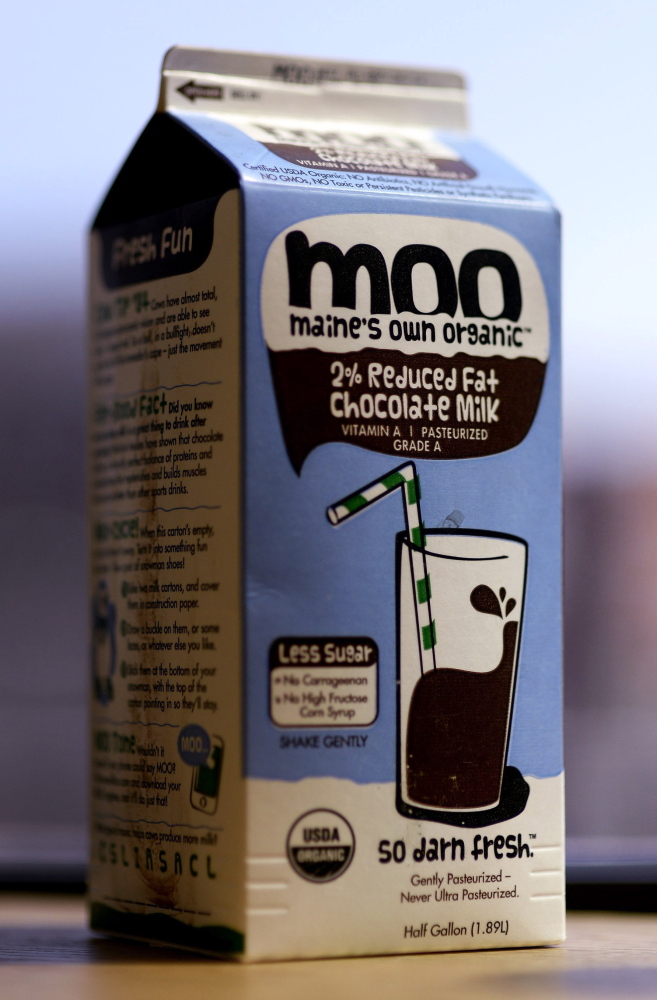The MOO Milk brand may not be dead after all.
The Maine Farm Bureau said Wednesday that it has authorized use of a special nonprofit emergency fund to help 12 organic dairy farms that had been producing milk for Maine’s Own Organic Milk, known as MOO Milk, following the company’s decision last week to cease operations.
An undetermined amount of money from the Maine Farm Bureau Disaster Relief Fund will be used to assist the farmers and facilitate talks with potential buyers for their organic milk, Farm Bureau Executive Secretary Jon Olson said. The bureau is accepting donations by mail for the relief fund.
Olson said the amount of funds going to help the farmers will be made up entirely of money donated for that specific cause. How much money will be available or how it will be used will be determined by how much is raised, he said.
Founded in 1998, the fund has been used for various emergencies such as the 1998 ice storm, for which $30,000 to $40,000 was raised, Olson said.
Farmers affected by the MOO Milk shutdown said they are hopeful a new buyer can be found for their products soon. The five-year-old organic milk company said faulty packaging equipment led to the decision to close, leaving the 12 dairy farms that supplied its milk in the lurch.
Ideally, the dairy farmers would like to continue using the MOO Milk brand.
“At this point, it’s too early to tell,” said Stephen Morrison, co-owner of Clovercrest Farm in Charleston. “We would love to be able to continue under our own name.”
Several hurdles would have to be cleared for that to happen.
First, the farmers would have to find a new buyer for their products. Possible candidates include Oakhurst Dairy, Organic Valley, Stonyfield and Horizon Organic, Morrison said.
The new buyer would have to decide to adopt the MOO Milk brand, and then it would have to obtain the legal rights to it.
“There are huge challenges around the label and the brand,” said Ted Quaday, executive director of the Maine Organic Farmers and Gardeners Association.
On the plus side, the farmers have received offers of financial support from consumers, businesses and organizations since the MOO Milk shutdown was announced, said Spencer Aitel, co-owner of Two Loons Farm in South China, one of the farmers affected by the shutdown.
Given the high level of interest, Aitel said, it is possible the farmers could raise interim funding through a Kickstarter campaign.
“If Kickstarter could get us through to a reorganization, bring it on,” he said.
If a new buyer is found for the milk, Aitel said, the 12 farms are committed to negotiating their new contract as a group.
“We’re trying really hard to hang together,” he said. “We don’t want guys to get left out in the cold.”
MOO Milk CEO Bill Eldridge said Friday that the Falmouth-based company decided to discontinue direct sales to consumers because of problems with its carton-filling equipment. Eldridge said the equipment is antiquated and had been churning out an increasing number of leaky cartons.
The company had hoped to continue operations at a new facility but decided construction would take too long to keep the brand viable, he said.
Eldridge said the company has a contract to sell its milk wholesale for the next 60 to 90 days to Stonyfield’s yogurt facility in Londonderry, New Hampshire.
That still leaves the 12 farms without a long-term solution to the loss of their primary buyer.
“Any kind of relief would really help,” said Laura Chase, co-owner of Chase’s Organic Dairy in Mapleton. “This certainly is a disaster.”
Chase’s husband and dairy co-owner, Vaughn Chase, said they have received many calls from customers upset about the demise of MOO Milk.
He said the bureau’s decision to provide disaster relief was welcome news.
David Bright, a Penobscot County farmer, and Rommy Haines of Aroostook County helped start MOO Milk in 2009 when a number of organic dairy farmers lost their contracts with Hood and needed a new processor to bring their milk to market.
After five years producing a boutique brand, those farmers are facing the possibility of returning to a large company.
Bright said discussions have begun with major brands such as Oakhurst Dairy, Organic Valley and Stonyfield.
The farmers would rather not go back to contracting with a large company, Aitel said, but all options remain on the table.
“We really are in trouble as a group,” he said.
Eldridge has said that MOO Milk is working to find a long-term buyer for the 12 farms, but Aitel said it is important for the farmers to initiate direct discussions without MOO Milk in the middle because of potential conflicts of interest.
J. Craig Anderson can be contacted at 791-6390 or at:
canderson@pressherald.com
Twitter: jcraiganderson
Send questions/comments to the editors.




Comments are no longer available on this story